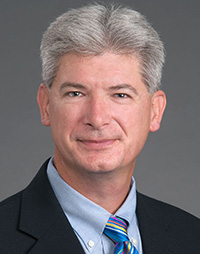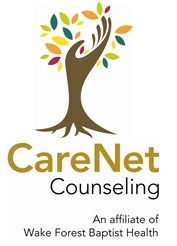Bryan Hatcher, MDiv, LCSW, is president of CareNet Counseling. He is an experienced counselor, chaplain, pastor, and adjunct faculty at Wake Forest University’s School of Divinity. Hatcher has a passion for not only delivering high-quality counseling services but also advocating for and serving those who are underserved. CareNet, a community-based counseling organization with more than 30 centers across North Carolina, is affiliated with Wake Forest Baptist Health.
Interview by Tom Peterson
Click HERE to go to CareNet
Who comes to CareNet for Counseling?
We serve the lifespan: our youngest clients are four or five years old, our oldest 94 or 95, though not all therapists see all age groups. Many of our clients are well employed with insurance and we use those benefits to help people. But about 25% of our clients are individuals who are uninsured or vastly under-insured and do not have that financial resources to cover the cost of counseling.
 Many people come to us with insurance and ability to make their copay deductibles. That covers the cost of their counseling. But our mission and our passion is also to serve the underserved and those without resources. So we have to raise funds for that.
Many people come to us with insurance and ability to make their copay deductibles. That covers the cost of their counseling. But our mission and our passion is also to serve the underserved and those without resources. So we have to raise funds for that.
And why are they coming?
Common issues coming to CareNet counseling are depression, anxiety, family stressors, relational distress of different sorts, that sort of thing. In the past few years, there has been a growing number of ADHD diagnoses. In the last year we have absolutely noted—and this plays out in all of the literature, as well—that these challenges are exacerbatedunder the stress of the COVID pandemic. People are having to live with isolation due to social distancing. Many are without jobs or have reduced incomes due to the pandemic. All of this has caused a strain on individuals and families that we’ve never experienced. For many who may live with a propensity toward depression or anxiety, their situation is now worse. For those who may live with a propensity toward addiction, the challenge has been vastly greater during the pandemic and continues to grow.
So we are trying to enhance some programs and actually start some new programs to meet those needs. During the pandemic, fortunately, CareNet has been has not had to turn people away. Like many mental health professionals, we transitioned last year to almost full telehealth, letting us spread or share clients across geography. We’ve been able to help clients see a therapist quickly, even in more rural, underserved areas. Part of the beauty of being a statewide network is that while our Winston-Salem office may be beyond capacity to receive a new referral, right up the road in Wilkes we have two new therapists who are still receiving new clients Because it’s virtual we can get people to the right therapist in a timely fashion.
One of our counselors who works with children in two pediatric care settings is consistently reporting to me the need for children to get back to school for the social developmental, and even the academic parts of what’s going on. Yesterday, she was describing to me a mother, a first-generation immigrant who came here five years ago with her only son. The father had abandoned the family. She works seven days a week, and her son is now an eighth grader. He is not a discipline issue at all, but he’s left alone to fend for himself, feeding himself, cleaning the house, and he’s playing video games 15 hours a day. So she and I are resourcing beyond therapy to get him a YMCA membership so he can go somewhere and participate in some activities.
We are convinced that the whole public education system is going to have to do a reset, to manage the loss of learning for the last 15 or 18 months before it’s over. Meanwhile, she’s helping middle schoolers and their parents manage the stress.
What is a CareNet counselor’s training?
All CareNet counselors are licensed mental health professionals with the state of North Carolina. All are at least master’s-level trained, many are doctoral-level trained. Beyond their academic training, we provide thorough and ongoing internal training. Our folks are also are attuned to the spiritual journeys of our clients. Believing that a person’s spiritual journey generally holds some strengths and resources that can be helpful to the issues they bring to therapy.
CareNet offers “spiritually-integrated” counseling. What does that mean?
CareNet was born out of a pastoral counseling tradition. In our early days now, 49 years ago, our job was actually to train clergy in counseling skills and send them back to their communities and congregations to be that resource locally. Because the profession has evolved in licensure and that sort of thing, we still do some training, but we train mental health professionals more than we train actual clergy.
But we hold to our original tradition because we still—and the literature plays this out—hold to the belief that all human beings are spiritual beings. Some of us have a very forthright, formal religious practice. Others have less of a formal religious practice, but we still believe in and hold value to some things that are greater than ourselves. And so whatever that spiritual journey is for the client, helping them engage that more deeply often allows them to access resources that they may either have not known about or have lost sight of. This can be useful in the issues they bring to therapy.
CareNet is a nonprofit that depends on donations. How are gifts used?
Donations allow us to serve that quarter of our caseload who are uninsured or under-insured and can’t afford counseling. They pay for sessions can help a client reduce anxiety, reduce depression, greater capacity to engage in academic and work scenarios, improve family, relational dynamics, which turns them into better citizens, so to speak and has an improved impact on the world. So, donations make sessions possible that impact not only that individual in the room but others, as well.
How do you measure CareNet’s impact?
Last year we provided 45,000 hours of psychotherapy. That translates into almost 6,000 individuals and families that we served. CareNet is the only statewide, spiritually integrated, psychotherapy practice affiliated with an academic medical center in the country. Most behavioral health providers, either individuals or programs, tend to serve one population or the other: it’s either the Medicaid and underserved population, or it’s the commercial and private pay population. We do both, we serve the whole community.
The academic literature tells us that every session of psychotherapy has a direct impact on an average of 10 people — the person who’s in the room and then those who are closest to that person. So, 6,000 people may sit in our offices, but 55,000 or 60,000 individuals may have an improved living space. And that improvement may be in academic performance, work performance, income levels, and so on. And as people are more stable, they are more productive, not just personally, but as a member of society. So, in concentric circles that improves community health, as well.
More than the quantitative data, the work we do is qualitative by nature. In one day at a recent Baptist state convention a dozen people approached me to say, “Oh, you’re CareNet. I need you to know how much you helped my son.” Or whoever. And then they would tell me a story. That’s data to me. And that’s the impact. And you know, their son probably saw us 20 years ago, but it’s still very much alive for them. And it made a real impact.

